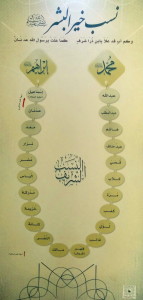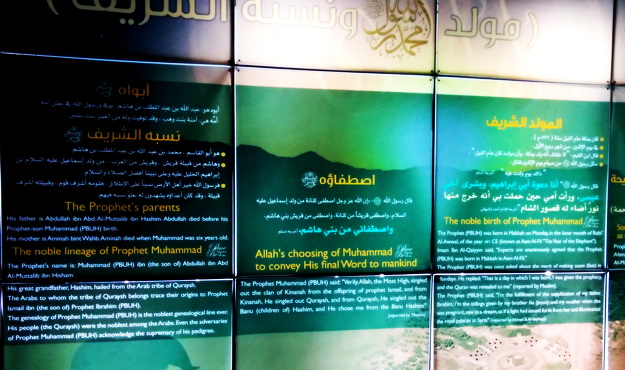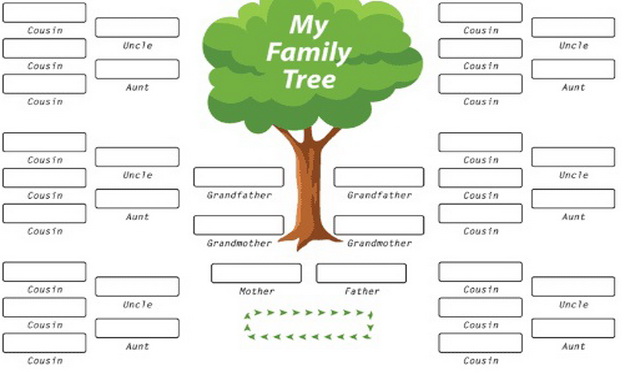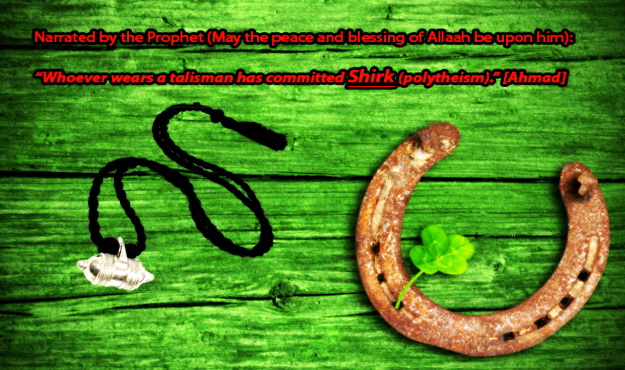With respect to the noble lineage of Prophet Muhammad (Sallallahu alayhi wassallam), there are three versions as stated below:
The first was authenticated by biographers and genealogists and states that Prophet Muhammad’s genealogy has been traced to ‘Adnaan. This version is authentic and well established. The second is subject to controversies and doubt, and traces his lineage beyond ‘Adnaan back to Ibraaheem (alayhis salaam). The third version, with some parts definitely incorrect, traces his lineage beyond Ibraaheem back to Adam (alayhis salaam).
The first part: Muhammad bin ‘Abdullah bin ‘Abdul-Muttalib (who was called Shaiba) bin Haashim, (named ‘Amr) bin ‘Abd-Manaaf (called Al-Mugheera) bin Qusai (also called Zaid) bin Kilaab bin Murrah bin Ka’ab bin Luaiy bin Ghaalib bin Faihr (who was called Quraish and whose tribe was called after him) bin Maalik bin An-Nadr (so called Qais) bin Kinaanah bin Khuzaimah bin Mudrikah (who was called ‘Amir) bin Ilyaas bin Mudar bin Nizaar bin Ma’ad bin ‘Adnaan.
The second part: ‘Adnaan bin Add bin Humaisi’ bin Salaman bin Aws bin Buz bin Qamwal bin Obai bin ‘Awwam bin Nashid bin Haza bin Bildas bin Yadlaf bin Tabikh bin Jahim bin Nahish bin Makhi bin Aid bin ‘Abqar bin ‘Ubaid bin Ad-Da’a bin Hamdan bin Sanbir bin Yathrabi bin Yahzin bin Yalhan bin Ar’awi bin Aid bin Deshan bin Aisar bin Afnad bin Aiham bin Muksar bin Nahith bin Zarih bin Sami bin Mazzi bin ‘Awda bin Aram bin Qaidar bin Ismaa’eel son of Ibraaheem (alayhumus salaam).
The third part: beyond Ibraaheem (alayhis salaam), Ibn Tarih (Azar) bin Nahur bin Saru’ bin Ra’u bin Falikh bin Abir bin Shalikh bin Arfakhshad bin Sam bin Nuh (alayhis salaam), bin Lamik bin Mutwashlack bin Akhnukh [who was said to be Prophet Idris (Enoch) (alayhis salaam) bin Yarid bin Mahla’il bin Qabin Anusha bin Sheeth bin Adam (alayhis salaam).
His (Sallallahu alayhi wassallam) Lineage
Just as he (Sallallahu alayhi wassallam) is the most complete of people in terms of character, the Prophet (Sallallahu alayhi wassallam) is superior to all other human beings in terms of his noble lineage. The Prophet (Sallallahu alayhi wassallam) said, “Verily, Allah — ‘Azza wa-Jall (the Possessor of might and majesty) – chose Ismaa’eel from the children of Ibraaheem; Kinaanah from the children of Ismaa’eel; Quraish from Kinaanah; the children of Haashim from Quraish; and me from the children of Haashim.” [Saheeh Muslim, “The Book of Virtues”; chapter, “The Superiority of the Prophet’s Lineage.” Hadeeth number: 2776.]
Imam Bukhaaree, may Allah have mercy on him – mentioned the lineage of the Prophet (Sallallahu alayhi wassallam) (keep in mind that ‘ibn’ means, ‘son of’):
‘He is Abul-Qaasim Muhammad ibn ‘Abdullah ibn ‘Abdul-Muttalib ibn Haashim ibn ‘Abd-Manaaf ibn Qusai ibn Kilaab ibn Murrah ibn Ka’ab ibn Luaiy ibn Ghaalib ibn Faihr ibn Maalik ibn An-Nadar ibn Kinaanah ibn Khuzaimah ibn Mudrikah ibn Ilyaas ibn Mudar ibn Nizaar ibn Ma’ad ibn ‘Adnaan.” [Saheeh Bukhaaree, “The Virtues of the Ansaar”; chapter, “The Sending of the Prophet (Sallallahu alayhi wassallam).” Hadeeth number: 3851.]
 In Sharhus-Sunnah, Al-Bagawee mentioned the Prophet’s lineage up until ‘Adnaan, and then said, “Beyond ‘Adnaan, his lineage is not correctly memorized.” [Sharhus-Sunnah (13/193)]
In Sharhus-Sunnah, Al-Bagawee mentioned the Prophet’s lineage up until ‘Adnaan, and then said, “Beyond ‘Adnaan, his lineage is not correctly memorized.” [Sharhus-Sunnah (13/193)]
‘Urwah ibn Az-Zubair (radhiAllaahu anhu) said, “The people we have found who say that they know who is beyond ‘Adnaan, are only guessing.” [Ibn Sa’d (1/58)]
Ibn Al-Qayyim mentioned the Prophet’s lineage until ‘Adnaan and then said, “(The Prophet’s) lineage until here is known to be correct and is agreed upon by genealogists, so there is no disagreement whatsoever. As for what is beyond ‘Adnaan, there is difference of opinion. Yet they (genealogists) unanimously agree that ‘Adnaan is from the direct line of Ismaa’eel (alayhis salaam).” [Zaad Al-Ma’ad (1/71)]
And Ibn Sa’d wrote in his Tabaqaat: “We refrain (from claiming any knowledge about the lineage of the Prophet (Sallallahu alayhi wassallam) between ‘Adnaan and Ismaa’eel (alayhis salaam).”
Adh-Dhahabee said, “Adnaan is from the children (i.e., from the direct line) of Ismaa’eel ibn Ibraaheem (alayhis salaam) and this is unanimously agreed upon by the people (i.e., by historians and genealogists), but they differ about those grandfathers (of the Prophet (Sallallahu alayhi wassallam)) that are between ‘Adnaan and Ismaa’eel (alayhis salaam).” [As-Seerah An-Nabawiyyah by Adh-Dhahabee (pg. 1).]
Men with noble lineages have throughout history been accorded with special honour. Generally speaking, a person with noble lineage is not denied the right to lead and to have authority, but people question the right of a person of low lineage to be a leader – a king, a president, an emperor, etc. Since the Prophet (Sallallahu alayhi wassallam) was being prepared for Prophethood, Allah (Subhanahu Ta’ala) blessed him with a noble lineage, thus making it easier for people to accept and follow him.
The Prophet (Sallallahu alayhi wassallam) indeed possesses a most wonderful lineage. He (Sallallahu alayhi wassallam) is from the direct line of both Ismaaeel and Ibraaheem (alayhumus salaam). Furthermore, he (Sallallahu alayhi wassallam) is the answer to Ibraaheem’s supplication; he (Sallallahu alayhi wassallam), said about himself, “I am the supplication of my father Ibraaheem (i.e., the answer to his supplication), and the glad tidings of my brother ‘Eesa (Jesus).” [Al-Haakim (2/600)]
It is most often the case that people who are blessed with noble lineages aspire for higher goals and aims, and turn away from base desires; and of course, this was especially true of Prophets (alayhumus salaam) and Messengers (alayhumus salaam).
The first narration mentioned in this section, as well as other similar narrations, points to the fact that Allah (Subhanahu Ta’ala) favoured Arabs above all other peoples, and the Quraish in particular above all other tribes. If one loves the Prophet (Sallallahu alayhi wassallam), then one should, by extension, love the people to whom he was sent and the tribe among whom he was born. That love should be felt not because of their race, but because of a simple reality: Every Quraishee (a member of the Quraish) Arab was blessed by being related to the Messenger of Allah (Sallallahu alayhi wassallam). This does not mean that we should love all individuals among the Quraish, nor does it run contrary to the reality that many members of the Quraish and many Arabs disbelieved in Islam. For as soon as one of them deviated from the truth and disbelieved in Allah (Subhanahu Ta’ala) the true relation between him and the Messenger of Allah (Sallallahu alayhi wassallam) became destroyed and any blood relation between them was taken out of consideration – and the same of course applies to present-day Arabs and descendants of the Quraish.
 navedz.com a muslim's Quest for the truth
navedz.com a muslim's Quest for the truth







